| Listing 1 - 10 of 18 | << page >> |
Sort by
|
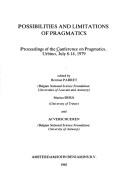
ISBN: 9027230064 1283222531 9027283176 9786613222534 9789027230065 9789027283177 Year: 1981 Volume: 7 Publisher: Amsterdam: Benjamins,
Abstract | Keywords | Export | Availability | Bookmark
 Loading...
Loading...Choose an application
- Reference Manager
- EndNote
- RefWorks (Direct export to RefWorks)
This impressive volume attempts to make an assessment of past achievements, but also to open up new perspectives in the field of pragmatics, exactly ten years after the publication of Searle's seminal Speech Acts. This rich collection presents an unrivaled diversity of topics and approaches united by the possibilities and limitations generic to the field of pragmatics.
Pragmatics --- Congresses --- Congresses. --- -801.56 --- 801.56 Syntaxis. Semantiek --- Syntaxis. Semantiek --- Pragmalinguistics --- General semantics --- Language and languages --- Logic, Symbolic and mathematical --- Semantics (Philosophy) --- Philosophy --- 801.56 --- Pragmatics - Congresses
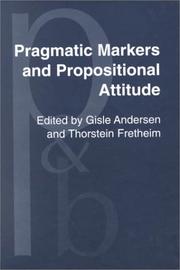
ISBN: 9027250987 1556197977 9786613174628 1283174626 9027283745 9789027250988 9789027283740 9781283174626 6613174629 9781556197970 Year: 2000 Volume: 79 Publisher: Amsterdam ; Philadelphia : J. Benjamins Pub.,
Abstract | Keywords | Export | Availability | Bookmark
 Loading...
Loading...Choose an application
- Reference Manager
- EndNote
- RefWorks (Direct export to RefWorks)
In interactive discourse we not only express propositions, but we also express different attitudes to them. That is, we communicate how our mind entertains those propositions that we express. A speaker is able to express an attitude of belief, desire, hope, doubt, fear, regret or pretence that a given proposition represents a true state of affairs. This collection of papers explores the contribution of particles and other uninflected mood-indicating function words to the expression of propositional attitude in the broad sense. Some languages employ this type of attitude-marking device extensively, even for the expression of basic moods and basic speech act categories, other languages use such markers sparsely and always in interaction with syntactic form. Both types of language are examined in this volume, which includes studies of attitudinal markers in Amharic, English, Gascon, Occitan, German, Greek, Hausa, Hungarian, Japanese, Norwegian and Swahili. The theoretical emphasis is on issues such as interpretive vs. descriptive use of utterances or utterance parts, procedural semantics, linguistic underdetermination of the proposition expressed and the speaker's communicated attitude to it, higher-level explicatures in the relevance-theoretic sense, the explicit - implicit distinction, as well as processes of grammaticalization and negotiation of propositional attitude in spoken interaction.
Pragmatics --- Proposition (Logic) --- Propositional attitudes --- General semantics --- Language and languages --- Logic, Symbolic and mathematical --- Semantics (Philosophy) --- Attitude (Psychology) --- Thought and thinking --- Philosophy --- Pragmatics - Congresses. --- Proposition (Logic) - Congresses.
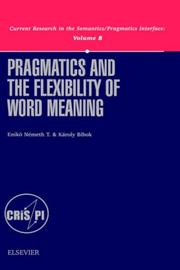
ISBN: 0080439713 0585474265 9780080439716 9780585474267 Year: 2001 Volume: 8 Publisher: Leiden; Boston : BRILL,
Abstract | Keywords | Export | Availability | Bookmark
 Loading...
Loading...Choose an application
- Reference Manager
- EndNote
- RefWorks (Direct export to RefWorks)
Recently, the investigation of word meaning in utterances has connected two different fields: lexical semantics and pragmatics. A new linguistic discipline, namely lexical pragmatics, is emerging. The eleven papers of the present book constitute a unit in the sense that they have a common aim: to explore the interaction between lexical semantics and pragmatics. The authors examine phenomena such as productive sense extension, regular polysemy, multifunctionality, implicit arguments and predicates, and non-typical anaphoric pronouns, on the basis of linguistic data, for instance, from English, Norwegian, Russian, and Hungarian, as well as using a great variety of frameworks (optimality framework, two-level semantics, the theory of generative lexicon, cognitive grammar, Gricean theory, and relevance theory.
Lexicology. Semantics --- Pragmatics --- Semantics --- 801.57 --- Formal semantics --- Semasiology --- Semiology (Semantics) --- Comparative linguistics --- Information theory --- Language and languages --- Lexicology --- Meaning (Psychology) --- Pragmalinguistics --- General semantics --- Logic, Symbolic and mathematical --- Semantics (Philosophy) --- 801.57 Pragmatiek --- Pragmatiek --- Philosophy --- Pragmatics. --- Pragmatics - Congresses. --- Semantics - Congresses
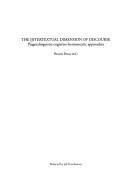
ISBN: 8489513449 9788489513440 Year: 1996 Publisher: Zaragoza: Universidad de Zaragoza,
Abstract | Keywords | Export | Availability | Bookmark
 Loading...
Loading...Choose an application
- Reference Manager
- EndNote
- RefWorks (Direct export to RefWorks)
Intertextuality --- Discourse analysis --- Pragmatics --- Pragmalinguistics --- General semantics --- Language and languages --- Logic, Symbolic and mathematical --- Semantics (Philosophy) --- Criticism --- Semiotics --- Influence (Literary, artistic, etc.) --- Discourse grammar --- Text grammar --- Semantics --- Philosophy --- Intertextuality - Congresses --- Discourse analysis - Congresses --- Pragmatics - Congresses
Book
ISBN: 9780857242471 0857242474 9004253246 9789004253247 Year: 2010 Volume: 9 Publisher: Bingley, England : Emerald,
Abstract | Keywords | Export | Availability | Bookmark
 Loading...
Loading...Choose an application
- Reference Manager
- EndNote
- RefWorks (Direct export to RefWorks)
Hedging is an essential part of everyday communication. It is a discourse strategy which is used to reduce commitment to the force or truth of an utterance to achieve an appropriate pragmatic effect. In recent years hedges have therefore attracted increased attention in Pragmatics and Applied Linguistics, with studies approaching the concept of hedging from various perspectives, such as speech act - and politeness theory, genre-specific investigations, interactional pragmatics, and studies of vague language. The present volume provides an up-to-date overview of current research on the topic by bringing together studies from a variety of fields. The contributions span a range of different languages, investigate the use of hedges in different communicative settings and text types, and consider all levels of linguistic analysis from prosody to morphology, syntax and semantics. What unites the different studies in this volume is a corpus-based approach, in which various theoretical concepts and categories are applied to, and tested against, actual language data. This allows for patterns of use to be uncovered which have previously gone unnoticed and provides valuable insights for the adjustment and fine-tuning of existing categories. The usage-based approach of the investigations therefore offers new theoretical and descriptive perspectives on the context-dependent nature and multifunctionality of hedges.
Hedge (Linguistics) --- Euphemism --- Pragmatics --- Euphemism. --- Pragmatics. --- Pragmalinguistics --- Hedging (Linguistics) --- General semantics --- Language and languages --- Logic, Symbolic and mathematical --- Semantics (Philosophy) --- Figures of speech --- Semantics --- Linguistics --- Philosophy --- E-books --- Hedge (Linguistics) - Congresses --- Euphemism - Congresses --- Pragmatics - Congresses
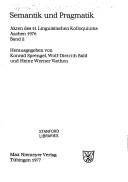
ISBN: 3484102756 3111611809 9783484102750 Year: 1977 Volume: 50 Publisher: Tübingen: Niemeyer,
Abstract | Keywords | Export | Availability | Bookmark
 Loading...
Loading...Choose an application
- Reference Manager
- EndNote
- RefWorks (Direct export to RefWorks)
Semantik und Pragmatik : Akten des 11. Linguistischen Kolloquiums : Aachen 1976, Bd. 2
Pragmatics --- Semantics --- Congresses. --- -Semantics --- -Formal semantics --- Semasiology --- Semiology (Semantics) --- Pragmalinguistics --- Congresses --- Lexicology. Semantics --- Linguistics --- Semantics - Congresses --- Pragmatics - Congresses --- General semantics --- Language and languages --- Logic, Symbolic and mathematical --- Semantics (Philosophy) --- Philosophy --- DEUTSCHE SPRACHE --- SEMANTIK --- PRAGMATIK
Book
ISBN: 9067652652 9067652644 Year: 1986 Volume: 7 Publisher: Dordrecht, Holland Providence, RI, USA Foris Publications
Abstract | Keywords | Export | Availability | Bookmark
 Loading...
Loading...Choose an application
- Reference Manager
- EndNote
- RefWorks (Direct export to RefWorks)
Pragmatics --- -Semantics --- -Formal semantics --- Semasiology --- Semiology (Semantics) --- Pragmalinguistics --- Congresses --- Lexicology. Semantics --- Semantics --- Congresses. --- Sémantique --- Pragmatique --- Congrès --- Semantics - Congresses. --- Pragmatics - Congresses. --- General semantics --- Language and languages --- Logic, Symbolic and mathematical --- Semantics (Philosophy) --- Philosophy
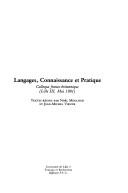
ISBN: 2865310108 9782865310104 Year: 1982 Publisher: Lille: Université de Lille III,
Abstract | Keywords | Export | Availability | Bookmark
 Loading...
Loading...Choose an application
- Reference Manager
- EndNote
- RefWorks (Direct export to RefWorks)
Linguistics --- Language and languages --- Language and logic --- Semantics --- Pragmatics --- Knowledge, Theory of --- Philosophy --- Congresses --- Philosophie du langage --- Linguistique --- Épistémologie --- Congresses. --- Philosophie du langage. --- Linguistique. --- Épistémologie. --- Language and languages - Philosophy - Congresses --- Language and logic - Congresses --- Semantics - Congresses --- Pragmatics - Congresses --- Knowledge, Theory of - Congresses
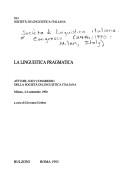
ISBN: 8871194772 9788871194776 Year: 1992 Volume: 32 Publisher: Roma: Bulzoni,
Abstract | Keywords | Export | Availability | Bookmark
 Loading...
Loading...Choose an application
- Reference Manager
- EndNote
- RefWorks (Direct export to RefWorks)
Italian language --- Pragmatics --- Linguistics --- Congresses. --- -Linguistics --- -Pragmatics --- -#KVHA:Pragmatiek; Italiaans --- Pragmalinguistics --- General semantics --- Language and languages --- Logic, Symbolic and mathematical --- Semantics (Philosophy) --- Linguistic science --- Science of language --- Romance languages --- Congresses --- Philosophy --- #KVHA:Pragmatiek; Italiaans --- Pragmatics - Congresses. --- Linguistics - Congresses. --- Italian language - Congresses.
Book
ISBN: 9789027259554 9789027264930 9027264937 9027259550 Year: 2017 Volume: 190 Publisher: Amsterdam: John Benjamins,
Abstract | Keywords | Export | Availability | Bookmark
 Loading...
Loading...Choose an application
- Reference Manager
- EndNote
- RefWorks (Direct export to RefWorks)
"Pragmatics forms nowadays an integral part of the description not only of modern languages but also of ancient languages such as Latin and Ancient Greek. This book explores various pragmatic phenomena in these two languages, which are accessible through corpora consisting of a broad range of text types. It comprises empirical synchronic studies that deal with three main topics: (i) speech acts and pragmatic markers, (ii) word order, and (iii) discourse markers and particles. The specificity of this book consists in the discussion and application of various methodological approaches. It provides new insights into the pragmatic phenomena encountered, compares, where possible, the results of the investigation of the two languages, and draws conclusions of a more general nature. The volume will be of interest to linguists working on pragmatics in general, and to scholars of Latin and Ancient Greek in particular"--
Latin language --- Greek language --- Pragmatics --- Classical languages --- Indo-European languages --- Classical philology --- Greek philology --- Italic languages and dialects --- Latin philology --- Grammar --- E-books --- Comparative linguistics --- Classical Latin language --- Classical Greek language --- 18.41 classical languages: general. --- Pragmatics. --- Grammar. --- Latin language - Grammar - Congresses --- Greek language - Grammar - Congresses --- Pragmatics - Congresses
| Listing 1 - 10 of 18 | << page >> |
Sort by
|

 Search
Search Feedback
Feedback About UniCat
About UniCat  Help
Help News
News